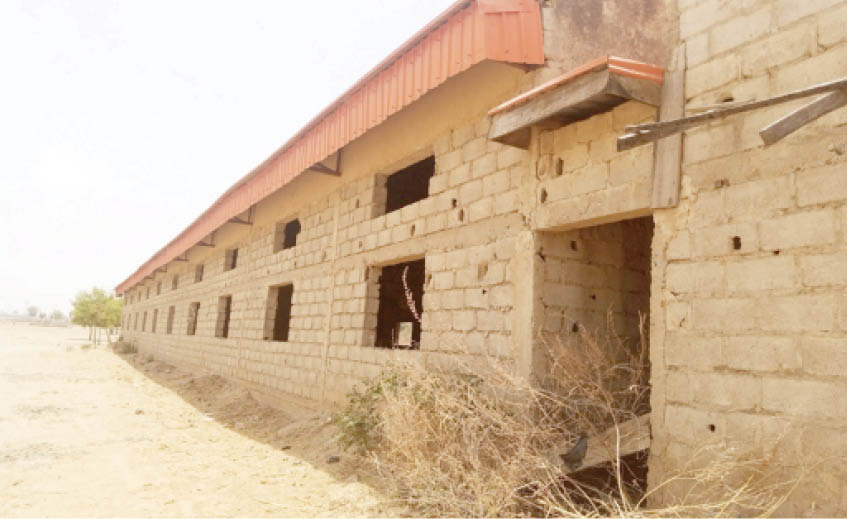Inside Kano’s ‘abandoned’ higher Islamic schools
Findings by Daily Trust have revealed that many of the 44 schools of Islamic studies have been completed.

Sections of the abandoned HIS at Dakasoye in Garun Malam Photo: Ibrahim Giginyu
A majority of the 44 higher Islamic schools established in Kano State between 2011 and 2015 are yet to be put to use despite the fact that many of them have been completed. Daily Trust reports the present state of the schools.
To provide quality Islamic education and infrastructural development in Kano State, the previous government established higher Islamic schools. The North West University (Yusuf Maitama University), the second owned by the state, was also established at the same period.
- Kannywood differs on Sadiya Haruna’s conviction
- Oladeinde Shoremi: Why Obasanjo and I are unbeatable in game of squash
Records have also shown that 26 academic and manpower development training institutes were established during that period, including 230 secondary schools.
Findings by Daily Trust have revealed that many of the 44 schools of Islamic studies have been completed.
According to sources close to the Ministry of Works and Housing, which supervised the construction of the schools, they were meant to compliment conventional secondary schools in the state by increasing enrolment.
The then Commissioner for Education in the state, Alhaji Tajuddeen Gambo, said the higher schools were established to absorb pupils from Islamiyya institutions.
He explained that the schools would issue certificates that would be equivalent to the Grade II teacher’s certificate.
“There are many people who attend Islamiyya schools but cannot find relevant institutions to further their studies, so these higher schools will provide an opportunity for them,” he said
It was also gathered that the then Kano State Government spent billions of naira to construct the 44 higher Islamic schools. For instance, the state government had set aside N6.5billion for the completion of the schools in 2014, barely a year before its tenure expired.
It was learnt that majority of these schools were completed six years ago. It was, however, discovered that most of them have been left unutilised since their completion. While few local governments decided to put sections of the completed schools into use, many of them have been abandoned.
Malam Shehu Ahmadu Bichi, an educationist, described the then state government’s initiative to establish the schools as very timely and calculative, taking into consideration the conservative nature of many people in the state towards conventional education.
He lamented that the present state government decided to abandon the multi-billion naira project to rot.
A visit to one of the schools at Dakasoye in Garun Malam Local Government Area revealed that the structure has been converted to an onion storing facility by some businessmen in the area. It was discovered also that most sections of the uncompleted building have been filled with onions.
According to Malam Aminu Baba Dakasoye, one of the merchants using the structure as a storing facility, those using the uncompleted school for that purpose had paid for it. Although he declined to mention those who collected money, he said he was optimistic that no one would evict them from the building because they were occupying the place legally.
“This one is better than others I have seen in some local governments. At least we are utilising this one. We collectively pulled resources and paid for the space here. We are taking advantage of the structure for security reasons. This is the first time we are using the school as our storage facility.
“Although I can’t tell you the recipient of the money, as business people, the place is relatively cheaper for us to manage and handle,” he said.
In some local governments, the completed schools have been locked for years while others have been taken over by weed.
Alhaji Zubairu Adam Karaye, a retired teacher, said the present state government should not play politics with such initiative. He added that with the free and compulsory education policy of the government, the 44 schools should be put into proper use.
“It is not good for the state to play politics with such a huge investment of taxpayers’ money. As a retired teacher, I advise that these schools should be utilised under the state’s compulsory and free basic education policy. This will indeed justify the project, it is far better than allowing it to rot,” he said.
When contacted the public relation officer of the ministry of education, Malam Aliyu Yusuf, said the issue of those not completed and those not put to use is currently under review as various measures have been taken to effectively utilize the schools.
He added that most of these schools have been now taken over by the State Universal Basic Education Board (SUBEB) and are currently being put to use.
He explained that the issue has been raised and the state government had since directed the authorities concerned to wade in and revert as appropriate.
“Most of these schools are now being put to use as the issue was brought before the state government. There is a plan to convert some of these schools to serve as bigger institutions than the initial plan. The state government has taken measures to effectively utilize all these schools within a short period, “ he said.
